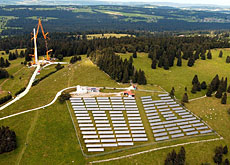
Swiss firms fall behind in green energy boom

The Swiss economy is missing out on a clean energy-powered bonanza because of a limited internal market, lack of innovation and the slow pace of incentive reform.
Despite some success stories, Switzerland has lost its leading edge and allowed other countries to cash in on soaring sector profits, according to industry expert Rolf Wüstenhagen.
The unpredictable price and supply of oil coupled with global warming fears have led to an increasing demand for renewable energy in recent years.
Private investment is thought to have quadrupled to $63 billion (SFr78.48 billion) between 2004 and 2006, with analysts comparing the interest from the finance sector to the dotcom boom of the late 1990s.
But Wüstenhagen, vice-director at St Gallen University’s Institute for Economy and the Environment, believes Switzerland has allowed its technological lead to slip from its grasp.
“Switzerland used to be the leading country in solar energy 15 years ago. In 1991 it had the highest export per capita ratio in the world,” he told swissinfo.
“In one sense Switzerland has lost a bit of ground in policy strategies, but the technology still exists here.”
No home market
Some Swiss institutions such as the Federal Institute of Technology in Zurich, continue to conduct groundbreaking research.
The problem at present is converting the ideas into big business opportunities to compete with market leaders in the United States, Germany, Denmark, France, Britain and Japan.
“One issue in Switzerland is that there is no strong home market yet [apart from hydro-power]. Unlike Denmark, for example, firms that specialise in wind power cannot sell to a home market and lack visibility as a result,” Wüstenhagen said.
“Switzerland is known more for its safe banking than risky garage start-ups. Firms need to look outside of Swiss borders where there are big markets and think out of the box more and focus on a specific part of the value chain.”
Big companies like ABB, who already have a large presence in the conventional energy field, have found a ready market in the renewable sector for their turbines, cables and software.
OC Oerlikon launched a division specialising in products for the solar industry early in 2006. Last December the manufacturing group landed an SFr320 million contract to help build a factory in Germany making thin-film solar modules.
Geopower Basel is developing the world’s first urban geothermal power plant that extracts energy from beneath the Earth’s crust. Despite being stopped in its tracks for the moment due to earth tremors, the project demonstrates that Switzerland is active in renewable energies.
Incentives stalled
A number of small Swiss companies are also taking advantage of the alternative energy boom, but nothing like the quantity in competing countries.
Part of the reason for this, according to Wüstenhagen, is that Switzerland has yet to introduce enough incentives, such as tax breaks, to properly stimulate the sector.
Government initiatives to liberalise the energy sector and to introduce a CO2 tax have been rejected by Swiss voters in recent years, while cantons have a mixed record at introducing their own incentive packages.
And the Swiss Business Federation, economiesuisse, rejected a government report promoting renewable energy last October as “baseless, premature and one-sided”.
But Wüstenhagen does draw some comfort from the experiences of Germany that now has a number of successful financial incentives in place to encourage green energy innovation.
“Businesses were initially against these reforms when they were first proposed in the 1990s. But over time the manufacturing industry realised that there was revenue and growth in these areas so they changed their stance,” he said.
“I hope to think that there is also a changing of attitudes in Switzerland with the increasing evidence of climate change and global warming.”
swissinfo, Matthew Allen
The Swiss government has set a goal of reducing CO2 emissions by 10% of 1990 levels by 2010.
It also wants to increase the proportion of electricity produced by renewable energy sources by 10% by 2030. Currently, 58% of Swiss electricity comes from such sources, with hydropower by far the largest contributor.
A task force called Energy Switzerland, charged with defining the country’s future energy needs, has recommended that electricity consumption should not increase by more than 5% between 2000 and 2010. However, by 2004 consumers were already using 7.4% more electricity than in 2000.
Switzerland’s five nuclear power plants provide 40% of the country’s electricity. From 2020, they will start to be decommissioned with the public unwilling to see new replacements built.
The International Energy Agency, the Global Wind Energy Council and the European Commission predict the solar sector to grow by 30% per annum, wind energy by 15% and a 10% growth every year in both the geothermal and bio-energy industries by 2010.
Research group Venture Business Research estimates that investment in clean energy start-up firms has quadrupled in the last two years from $500 million (SFr622 million) in 2004 to $2 billion (SFr2.49 billion) last year.
New Energy Finance put investment spending in all levels of the industry at $63 billion last year compared with $30 billion in 2004.

In compliance with the JTI standards
More: SWI swissinfo.ch certified by the Journalism Trust Initiative





























You can find an overview of ongoing debates with our journalists here . Please join us!
If you want to start a conversation about a topic raised in this article or want to report factual errors, email us at english@swissinfo.ch.